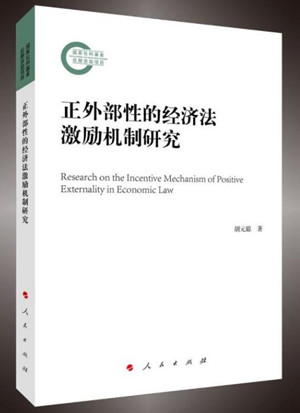


Positive externality and economic law

Research on the Incentive Mechanism of Positive Externality in Economic Law
Research on the Incentive Mechanism of Positive Externality in Economic Law, by Hu Yuancong, a professor from the Economic Law School at Southwest University of Political Science and Law, introduces the economic term “positive externality” into legal research, outlining the specific behaviors that require legal incentives, namely positive externality behaviors.
Negative externalities are more likely to attract legal attention because of their negative effects and social consequences. Therefore, current legal rules are primarily targeted at the regulation of negative externalities. Negative externalities need to be regulated by law, while positive externalities also call for legal incentives. There are obvious differences between positive and negative externalities, yet the law generally does not proactively encourage positive externalities. Typically, positive externalities are encouraged by moral means, but only relying on moral incentives can result in a serious shortage of positive externalities. Therefore, there must be a transition from relying on moral incentives to relying on legal incentives.
How to stimulate positive externalities by means of economic law and follow the new institutional needs arising from economic and social changes is a topic that economic law system design needs to carefully consider. The logical starting point of economic law is market failure, while the institutional incentive of positive externalities constitutes an integral part therein. The vision from the incentive of positive externalities contributes to the theoretical support and institutional construction of economic law.
Hu adopts historical research methods to collect laws and regulations with incentive properties from ancient and modern countries, while employing statistical methods to systematically comb Chinese laws in the narrow sense from 1979 to 2018. The author proves and highlights the objective existence of the “invisible” incentive method, presents the incentive content in graphical form, and conducts typological analysis from both temporal and methodological perspectives. The summarized development principles of incentive methods have significant theoretical innovation value.
The incentive method of economic law is chiefly demonstrated by the formulation of special normative legal documents, special chapters, and special clauses. Specifically, legal texts and practices focus on the distribution of rights, obligations, and responsibilities, the allocation of costs and benefits, and the granting of qualifications, treatment, and honors. These incentives are further categorized into eight types, namely entitlement of rights, remission of obligations, reduction of responsibilities, increase of benefits, reduction of costs, special qualifications, special treatment, and special honors.
The book constructs the theoretical framework and practice model of China’s legal incentives with the typification method, and inspires a new way for formulating and modifying incentive laws, implying practical innovative value.
Ying Feihu is a professor from the Law School at Guangzhou University.
Editor:Yang Lanlan
Copyright©2023 CSSN All Rights Reserved